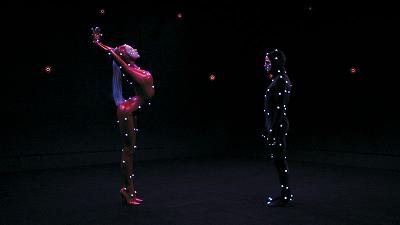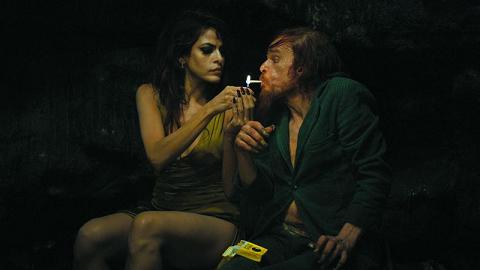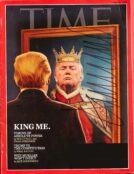Perplexing, captivating and even frustrating, Holy Motors is a film that delights in the surreal.
Certainly, it’s a viewing experience that won’t be forgotten, director and writer Leos Carax’s filmic ode to cinema blurring the lines between its own reality and the fantasy worlds held within.
The film opens strikingly. We observe an audience in black-and-white in a movie theatre, watching what appears to be a silent film. Light gradually builds to reveal their silhouettes, but not their faces. Our next scene takes us to a man (Carax himself) waking up in a hotel room, with a dog.
Wearing sunglasses despite the fact he’s in darkness, he finds a mysterious hidden door, which leads to the same theatre. Thus far, the only soundtrack is birdsong and an ominous, dull sound of machinery or similar, creating a tension and sense of intrigue that is well and truly grabbed.
Holy Motors introducing itself by presenting the audience in such a manner highlights that the group is impartial and play as mere observers, which transposes to us, the real audience. At no point is what’s ahead to allow us to be involved emotionally, or at least not for very long.
Of course, Holy Motors does at first make a pretence at a conventional storytelling method. Our third scene cuts to Monsieur Oscar, who appears to be a wealthy businessman. Picked up by a limousine, he prepares for his day of appointments, and for his first, is dropped off in central Paris. Here, expectations end; emerging dressed as an old beggar woman, Oscar and his film(s)—as it appears that the man is an actor—deliver their first surprise, signalling that Holy Motors will work hard to pull the rug from beneath our feet.
And, it certainly does consistently; when he returns to his limo, it serves as a mobile dressing room, Oscar dressing according to appointment while driven en route. Thus, we are transported from set piece to set piece, all seemingly unconnected, all starkly different to each other, none taking root long enough to provide any direction for the viewer other than observance.
In fact no semblance of story is hinted at, save for some interaction between Oscar and his driver, and a clue provided around halfway. All rather indulgent and perhaps even approaching maddening, but no less fascinating for it.
It would be very easy to lose patience with the film, if not for Denis Lavant, who plays Monsieur Oscar and his multitude of characters (including Monsieur Merde, last seen in 2008’s Tokyo!, who runs rampage through Père Lachaise Cemetery and kidnaps Eva Mendes’ passive, high-end model). Should any pressure have been felt in being required to be such a chameleon, it certainly doesn’t show, the actor hopping roles almost casually.
But, what is Holy Motors really about, other than as a tribute to filmmaking? A real world is hinted at within—one is never quite sure—and implies a certain slavery to art, whilst also scoffing at reality, a character’s punishment for lying that she is to be herself.
The truth, and the beauty of the film is that it is wide open to interpretation. Usually, for multiple emotional or logical outcomes a film must involve the viewer, but Holy Motors is orchestrated in order to do the complete the opposite. Here is where the film’s genius lies.
DVD Release Monday 28 January

Naila Scargill is the publisher and editor of horror journal Exquisite Terror. Holding a broad editorial background, she has worked with an eclectic variety of content, ranging from film and the counterculture, to political news and finance.























